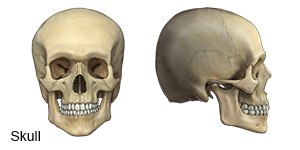Skull Fracture in Children
Medically reviewed by Drugs.com. Last updated on Aug 4, 2025.
A skull fracture is a break in a bone in your child's head.
 |
WHILE YOU ARE HERE:
Informed consent
is a legal document that explains the tests, treatments, or procedures that your child may need. Informed consent means you understand what will be done and can make decisions about what you want. You give your permission when you sign the consent form. You can have someone sign this form for you if you are not able to sign it. You have the right to understand your child's medical care in words you know. Before you sign the consent form, understand the risks and benefits of what will be done to your child. Make sure all of your questions are answered.
Blood tests
help give healthcare providers information about how your child's body is working.
An IV
is a small tube placed in your child's vein that is used to give medicine or liquids.
Neurologic signs
are also called neuro signs, neuro checks, or neuro status. During a neuro check, a healthcare provider checks how your child's pupils react to light. He or she may check your child's memory and how easily he or she wakes up. His or her hand grasp and balance may also be tested. How your child responds to the neuro checks can show if his or her injury has affected his or her brain.
An intracranial pressure monitor
is a device to measure the pressure inside your child's skull.
Related medications
Stay with your child for comfort and support
as often as possible while he or she is in the hospital. Ask another family member or someone close to the family to stay with your child when you cannot be there. Bring items from home that will comfort your child, such as a favorite blanket or toy.
Medicines:
Your child may need any of the following:
- Pain medicine may be given. Ask how often your child should get the medicine and how much he or she needs. Watch for signs of pain in your child.
- Diuretics are given to decrease fluid pressure in your child's head.
- Anticonvulsant medicine is given if your child's has seizures.
- Antinausea medicine may be given to calm your child's stomach and control vomiting.
- Sedative medicine may be given to help your child stay calm and relaxed.
- Antibiotics are given to help prevent or treat a bacterial infection.
Activity:
At first your child may need to rest in bed. Your child's healthcare provider will tell you when it is OK to get your child out of bed. Call a healthcare provider before you get your child up for the first time. If he or she feels weak or dizzy, have him or her sit or lie down right away.
Treatment:
- A neck brace may be used to prevent your child from moving his or her head and neck.
- Irrigation and debridement is done when there is an open wound on the head. This helps to clean and remove objects, dirt, or damaged tissue from the fracture area.
- Surgery may be needed correct damage to your child's skull and surrounding tissue.
Treatment options
The following list of medications are related to or used in the treatment of this condition.
RISKS:
A skull injury may cause bleeding, head deformity, seizures, or infection in the brain. If not treated early, brain damage, paralysis, and even death may occur.
CARE AGREEMENT:
You have the right to help plan your child's care. Learn about your child's health condition and how it may be treated. Discuss treatment options with your child's healthcare providers to decide what care you want for your child.© Copyright Merative 2025 Information is for End User's use only and may not be sold, redistributed or otherwise used for commercial purposes.
The above information is an educational aid only. It is not intended as medical advice for individual conditions or treatments. Talk to your doctor, nurse or pharmacist before following any medical regimen to see if it is safe and effective for you.
Learn more about Skull Fracture
Treatment options
- Medications for Head Injury
- Medications for Head Injury w/ Intracranial Hemorrhage and Loss of Consciousness
- Medications for Head Injury with Intracranial Hemorrhage
- Medications for Head Injury with Loss of Consciousness
Care guides
Symptoms and treatments
Further information
Always consult your healthcare provider to ensure the information displayed on this page applies to your personal circumstances.
